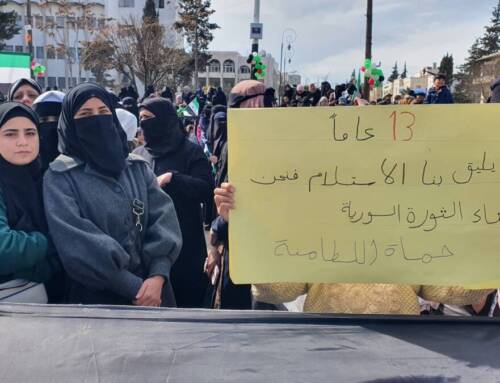‘We don’t know when the bombardment will stop’: Airstrike destroys last bakery in northern Hama
A reportedly Russian airstrike destroyed the last bakery in the […]
3 April 2017
A reportedly Russian airstrike destroyed the last bakery in the northern Hama countryside on Saturday.
The bakery housed an industrial-scale bread oven, which served 40,000 residents across rebel-held areas of northern Hama in Syria’s northwest. On Monday, a spokesman for a local council in the region told Syria Direct that it cannot be rebuilt as long as regime and Russian bombardment continues.
“We don’t know when the bombardment will stop,” Mohammed al-Abdullah, spokesman for the Kafr Zeita Local Council, tells Syria Direct’s Noura Hourani.
Saturday’s airstrike is the latest in a two-week air campaign by the regime and its allies on the northern Hama countryside and southern Idlib province.
Rebel factions in the area launched a renewed campaign on March 21 to take the provincial capital of Hama city and the military airbase to the south. Syrian Arab Army forces and pro-Assad militias are now pushing opposition forces to the north once more, backed by intense shelling and airstrikes.
Despite heavy bombardment of the roads, local council members are sending trucks to bakeries in southern Idlib to secure bread, a staple in the Syrian diet, for north Hama residents.

Baking bread at home is not an option,Abu Hajer, a local council member in the northern Hama city of Halfaya, tells Syria Direct. His town was one of those impacted by the strike on the bakery, which accepted flour and fuel donated from humanitarian organizations.
“Even if we did have flour and fuel in the first place, people aren’t able to move because of the bombardment,” says Hajer. “How could we distribute it?”
Q: How have Kafr Zeita and area residents been getting bread since Saturday’s airstrike?
The closest bakery is 15 kilometers from Kafr Zeita, in the Idlib countryside. I do not want to specify where—I’m afraid that it will be targeted. At this point, what we’re doing is sending a truck to that Idlib bakery. The truck then delivers bread from the Idlib countryside to Kafr Zeita.
It’s becoming increasingly difficult for the local council to secure, transport and distribute bread to those who depend on it. We’re covering the additional costs. The bakery in the Idlib countryside is under pressure to meet demands, as it is now working [to serve] additional areas. On top of that, the roads are being bombarded.
Prices have remained fixed in Kafr Zeita because the local council is taking on the excess costs. However, after the bombardment of the bread oven, quantities and prices are fluctuating from place to place.
Q: Can your council rebuild the bakery?
The oven is entirely out of service. The water and fuel storage tanks were completely destroyed. We can’t rebuild the oven now because of the bombardment. We don’t know when it will stop or what will happen in the future.
Q: Russian and regime warplanes are continuing to conduct airstrikes on the northern Hama countryside and southern Idlib for the second week in a row. How many residents remain in Kafr Zeita?
The population is changing rapidly, but right now, there are about 10,000 people in Kafr Zeita alone. The northern Hama countryside is witnessing a huge wave of displacement. There are villages that have completely emptied out because of the barbaric shelling, which hasn’t left any civilian areas untouched.
[Ed.: The UN’s Office for the Coordination of Humanitarian Affairs (OCHA) reported on March 28 that regime-rebel clashes in the northern Hama countryside displaced up to 40,000 local residents.]**
Abu Hajer is a member of the local council in Halfaya, a town located 12km south of Kafr Zeita in the northern Hama countryside.
Q: On Saturday, the last bakery in the northern Hama countryside was destroyed in an airstrike. How are you able to secure bread for the people of Halfaya?
Before the strike, we were completely dependent on the bakery to provide bread for the residents of Halfaya and the neighboring villages. Now, we have to face great risks in order to bring bread from the Idlib countryside. We need 2,400 bundles of bread [Ed.: each bundle is 1kg] every day.
Q: Could you talk about the importance of this bakery to local residents? Can people make bread by hand in their homes?
People are dependent on bakeries. They can’t make bread by hand because it is incredibly difficult to get flour. We rely on flour provided by [humanitarian] organizations, who supply flour only to the bakery.
[Ed.: Kafr Zeita’s bakery received support from the Elaf Organization for Relief and Development, a partner of the Istanbul-based Foundation for Human Rights, Freedoms and Humanitarian Relief (IHH).]Even if we did have flour and fuel in the first place, people aren’t able to move because of the bombardment, so how could we distribute it?
Some people have begun to transport bread themselves in their cars. They are taking risks and trying to take advantage of the demand in areas far from a bakery. These people sell the bread at double the price.
Q: Where is the nearest bakery to Halfaya? How have bread prices been affected by the destruction of the bakery?
Unfortunately, the nearest bakery is 30km from Halfaya, which makes the situation very difficult. For now, we are hiring a car every day to travel [to Idlib]. Because of the added transportation costs, the price of a bundle of bread went from SP175 [$0.30] to SP225 [$0.40] and will likely reach SP250 [$0.45] in the coming days. It’s a major burden on the people.
The organizations that supported the bakery are now redistributing flour to other bakeries that are operational.







